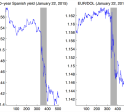Japan-Europe, the unnoticed megadeal
By Sébastien Jean
Trade between Japan and the EU is not a big deal in world trade, barely more than 1%. Their Economic Partnership Agreement can nevertheless be very influential because, jointly, they are a party in more than 40% of world trade, and much more in innovative sectors.





.bmp)





